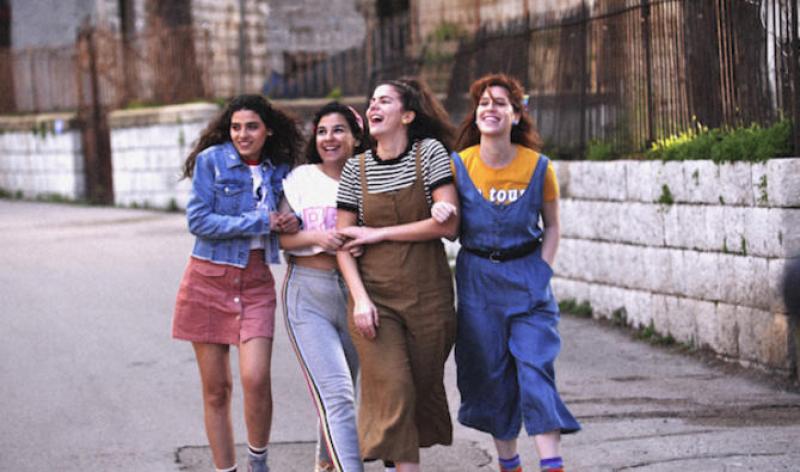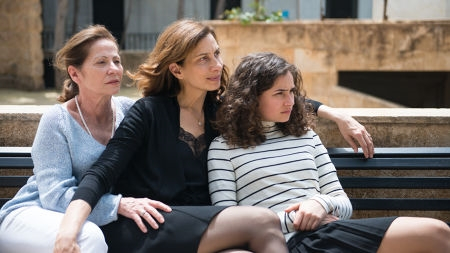Memory Box review - exquisitely made drama set in Lebanon | reviews, news & interviews
Memory Box review - exquisitely made drama set in Lebanon
Memory Box review - exquisitely made drama set in Lebanon
Ingenious fusion of archival material and constructed narrative brings the civil war to life

Memory Box is that rare thing, a glimpse into a lost world from its traumatised inhabitants. Made by the Lebanese artist-filmmakers, Joana Hadjithomas and Khalil Joreige (a husband and wife team), it’s an intergenerational drama split between Beirut during the Eighties (the height of the Lebanese Civil War) and present day Canada.
During the war, over a million people fled the country, including Hadjithomas’s best friend, a teenage girl who moved to Paris.They kept in close touch sending each other notebooks filled with photos, drawings, magazine cuttings and recorded voice messages on cassette tapes. It’s that archival material that forms the documentary backbone to Memory Box and is brought to life on screen deploying an artful mix of techniques – Super 8 film, animation, recreations and superimposition. We are steeped in these teenagers’ friendship, their romances, their battles with parents and angst over fat thighs and pimples. But this isn’t a documentary – an imagined narrative is constructed around these fragments from the past.
The crate containing these memories arrives unexpectedly on a snowy Christmas Eve in Montreal at the house of Maia, a divorcée who lives with her teenage daughter, Alex. Maia is not home, but her own mother Téta (Lebanese for granny) is preparing vine leaves and kibbeh for the holidays. Played by the brilliant Clémence Sabbagh (pictured below left), Téta recognises a potential Pandora’s Box. She knows its secrets will cause trouble and hides it in the basement. But Téta and Maia (beautifully portrayed by Rim Turki, pictured below centre), and her insatiably curious daughter Alex (Paloma Vauthier, pictured below right) are soon at loggerheads about the box's contents.
 Maia needs to come to terms with the reason why the box has been sent to her after all these years. It triggers resentment against her mother Téta for other long held secrets that boil over in an angry scene. Meanwhile Alex, an aspiring photographer herself, wants to know about her mother’s teenage years in Beirut and goes about secretively reading the notebooks and snapping the contact sheets and portraits she sneaks out of the basement. All these revelations are relayed to her (unseen) friends via her smart phone, highlighting the shift in communication tech since her mother’s teen years mailing audiotapes.
Maia needs to come to terms with the reason why the box has been sent to her after all these years. It triggers resentment against her mother Téta for other long held secrets that boil over in an angry scene. Meanwhile Alex, an aspiring photographer herself, wants to know about her mother’s teenage years in Beirut and goes about secretively reading the notebooks and snapping the contact sheets and portraits she sneaks out of the basement. All these revelations are relayed to her (unseen) friends via her smart phone, highlighting the shift in communication tech since her mother’s teen years mailing audiotapes.
Memory Box is very beautifully made. As well as the intricate graphic treatments of the archival material, every shot in the present day scenes and flashbacks are carefully composed with much use being made of door and window frames. Western pop hits from bands like Visage and Blondie as well as Lebanese indie bands like the Bunny Tylers duo, keep the soundtrack vibrant. There is an exquisite final sequence depicting Beirut Tthrough time lapse photography.
he acting by all the female leads is excellent and the engaging dialogue is split between French and Arabic. But the promised traumatic revelations are oddly muffled in the second half of the film. And there’s very little about the politics of Lebanon during the war or in the present day. It's as if the film’s makers don’t want to distract an international art house audience from the poetry of their images or widen their focus away from family history and romantic dynamics.There are hints – Maia’s teenage friend was a Catholic, her forbidden lover, Raja, was a sympathiser to the resistance. But without an intimate knowledge of the Lebanese civil war’s history, these points would pass a viewer by. Despite that caveat, Memory Box is an engaging and enjoyable drama.
The future of Arts Journalism
You can stop theartsdesk.com closing!
We urgently need financing to survive. Our fundraising drive has thus far raised £49,000 but we need to reach £100,000 or we will be forced to close. Please contribute here: https://gofund.me/c3f6033d
And if you can forward this information to anyone who might assist, we’d be grateful.

Subscribe to theartsdesk.com
Thank you for continuing to read our work on theartsdesk.com. For unlimited access to every article in its entirety, including our archive of more than 15,000 pieces, we're asking for £5 per month or £40 per year. We feel it's a very good deal, and hope you do too.
To take a subscription now simply click here.
And if you're looking for that extra gift for a friend or family member, why not treat them to a theartsdesk.com gift subscription?
more Film
 Oslo Stories Trilogy: Love review - freed love
Gay cruising offers straight female lessons in a heady ode to urban connection
Oslo Stories Trilogy: Love review - freed love
Gay cruising offers straight female lessons in a heady ode to urban connection
 Beating Hearts review - kiss kiss, slam slam
Romance and clobberings in a so-so French melodrama
Beating Hearts review - kiss kiss, slam slam
Romance and clobberings in a so-so French melodrama
 Materialists review - a misfiring romcom or an undercooked satire?
Writer-director Celine Song's latest can't decide what kind of film it is
Materialists review - a misfiring romcom or an undercooked satire?
Writer-director Celine Song's latest can't decide what kind of film it is
 theartsdesk Q&A: actor Leonie Benesch on playing an overburdened nurse in the Swiss drama 'Late Shift'
The Guildhall-trained German star talks about the enormous pressures placed on nurses and her admiration for British films and TV
theartsdesk Q&A: actor Leonie Benesch on playing an overburdened nurse in the Swiss drama 'Late Shift'
The Guildhall-trained German star talks about the enormous pressures placed on nurses and her admiration for British films and TV
 Freakier Friday review - body-swapping gone ballistic
Lindsay Lohan and Jamie Lee Curtis's comedy sequel jumbles up more than their daughter-mother duo
Freakier Friday review - body-swapping gone ballistic
Lindsay Lohan and Jamie Lee Curtis's comedy sequel jumbles up more than their daughter-mother duo
 Eight Postcards from Utopia review - ads from the era when 1990s Romania embraced capitalism
Radu Jude's documentary is a mad montage of cheesy TV commercials
Eight Postcards from Utopia review - ads from the era when 1990s Romania embraced capitalism
Radu Jude's documentary is a mad montage of cheesy TV commercials
 The Kingdom review - coming of age as the body count rises
A teen belatedly bonds with her mysterious dad in an unflinching Corsican mob drama
The Kingdom review - coming of age as the body count rises
A teen belatedly bonds with her mysterious dad in an unflinching Corsican mob drama
 Weapons review - suffer the children
'Barbarian' follow-up hiply riffs on ancient fears
Weapons review - suffer the children
'Barbarian' follow-up hiply riffs on ancient fears
 theartsdesk Q&A: filmmaker Dag Johan Haugerud on sex, love, and confusion in the modern world
The writer-director discusses first-love agony and ecstasy in 'Dreams', the opening UK installment of his 'Oslo Stories' trilogy
theartsdesk Q&A: filmmaker Dag Johan Haugerud on sex, love, and confusion in the modern world
The writer-director discusses first-love agony and ecstasy in 'Dreams', the opening UK installment of his 'Oslo Stories' trilogy
 Oslo Stories Trilogy: Dreams review - love lessons
First love's bliss begins a utopian city symphony
Oslo Stories Trilogy: Dreams review - love lessons
First love's bliss begins a utopian city symphony
 Blu-ray: Two Way Stretch / Heavens Above!
'Peak Sellers': two gems from a great comic actor in his prime
Blu-ray: Two Way Stretch / Heavens Above!
'Peak Sellers': two gems from a great comic actor in his prime

Add comment